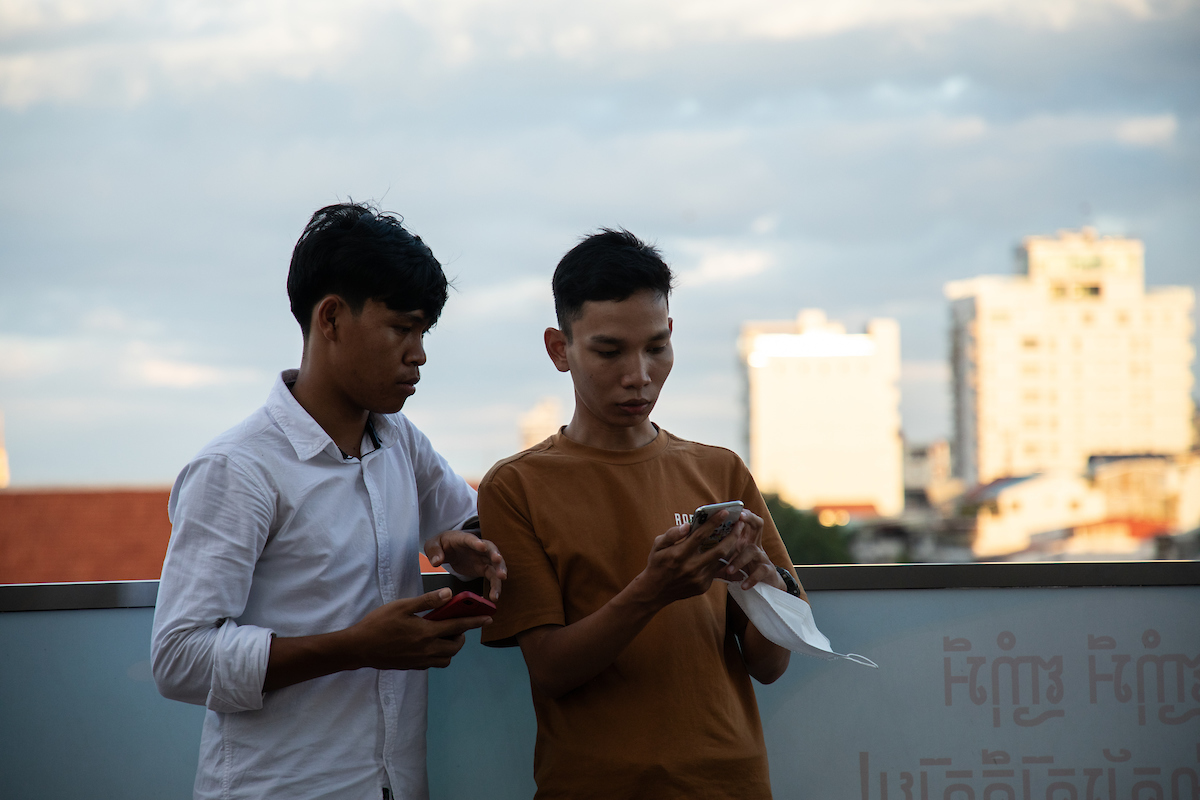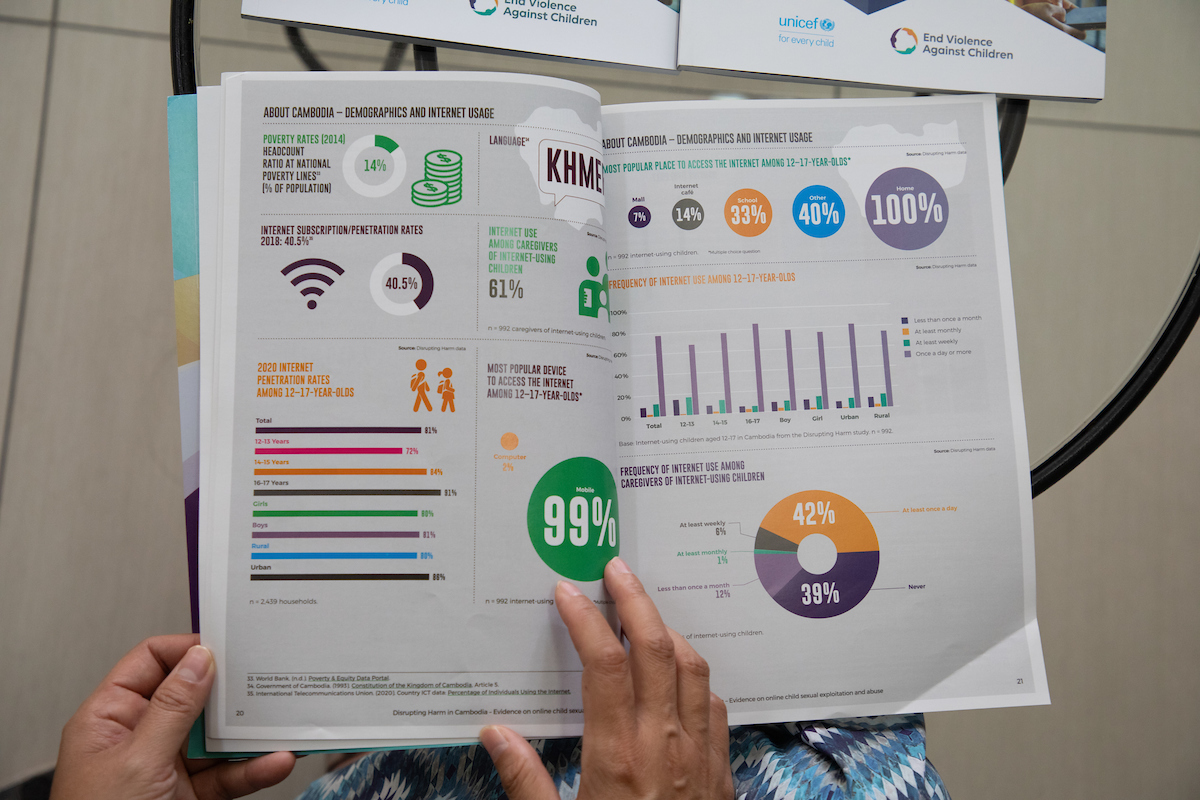“I was not even a 13-year-old boy when I began my online friendship with a man. He flattered me and made me feel good. He began to request nudes. One followed by the other, until one day he threatened to publish all… He wanted me to send him money, or else, he would publish all my private images. I had no money to send him. I kept sending him more photos because it was either sending more nudes or all my images would go online. But he did it anyway and all my nude videos and images went online. I did not know what to do. I was so scared. It took me a while, but I opened up to my mother, who then went to the authorities that could help us.” These are the words of 15-year-old Kai (name changed).
“This man, whose photo I never saw, whose real name he never shared with me… We started talking when he added me on Facebook 3 years ago. I liked his way of speaking to me. He liked me, he found me attractive and he was always paying attention to me. He was kind. I felt close to him, so we decided to be in a relationship. I never met him. After some time of a growing online relationship, I began sending him private photos. He requested more. Over time, he asked to meet up in person for sexual purposes. I did not want to. He began to threaten me. It was either meeting up with him or sending more nudes, or else he would share all I had shared online with the public. And he did that. My friends, my family… They all saw.” Alice (name changed), a 17-year-old girl from Phnom Penh.

Disrupting Harm reveals concerning data on online CSEA in the country
In the heart of Cambodia, a silent crisis expands as children face the dark side of the digital world.
Children are commonly exploited or abused online by familiar individuals; however, the digital environment also facilitates encounters with strangers who might exploit or abuse them. Disrupting Harm, a multi-country flagship research, funded by Safe Online, revealed that a staggering 11% of internet-using children aged 12–17 in Cambodia fell victim to online sexual exploitation and abuse (CSEA) in 2021 alone. Behind this grim statistic lie stories of children sexually extorted, coerced, and exploited through the very technology meant to connect and educate.
“It was not only Kai,” his mother says, and she continues: “How can you help your child in such a horrible situation?“
In Cambodia, many children face the grim reality of online exploitation. However, amidst these challenges, there’s hope emerging from collaborative efforts of UNICEF through funds received from Safe Online. With this support, UNICEF Cambodia has embarked on a mission to combat online child sexual abuse through a multi-faceted strategy.
The journey began with the development and implementation of national action plans. UNICEF Cambodia partnered with the Cambodian government and the Cambodia National Council for Children to draft a comprehensive five-year plan (2020-2025) aimed at preventing and responding to online child sexual exploitation. This plan laid out strategic steps to safeguard children online, emphasising the need for a coordinated response to the challenges posed by internet use.

UNICEF worked with APLE Cambodia, an NGO focused on child protection, and this cooperation has initiated significant measures to combat online child sexual exploitation in Cambodia. “We’ve been partnering with UNICEF Cambodia for many years, working on various projects. However, the Safe Online project focused specifically on addressing child vulnerabilities to online sexual abuse and exploitation. As part of this project over the past year and this year, we’ve been working to enhance government policies and leadership awareness to effectively respond to this issue. Additionally, we’ve been developing training curriculums and manuals to support national law enforcement training programs,” explains Mr. Seila Samleang, Director of APLE Cambodia.
Utilising Safe Online’s funds and partnering with UNICEF, APLE established an internet hotline within the InHope Network, another Safe Online grantee, to offer a secure channel for reporting online child abuse cases, fostering collaboration with law enforcement and the tech industry for content removal and victim identification. Simultaneously, APLE is undertaking community education programmes to teach parents and teachers about online safety and how to protect kids in the digital world. APLE seeks to build a robust response to digital safety for children through better laws and more awareness for everyone involved.
UNICEF, working together with organisations like APLE, has improved ways to block and report harmful content online including setting up platforms and internet-based systems to report abuse cases swiftly. Also, UNICEF has focused on training social workers to handle these cases effectively. This concerted effort culminated in tangible results, exemplified by Kai’s mother’s touching testimony:
After talking to my son I realised that many children in the neighbourhood had been groomed. I immediately contacted the police, who were able to help. They provided me with the contact information for APLE. APLE offered psychological support for Kai, carefully worked with all the information available, and aided in identifying the person. Thanks to APLE’s support and the work of the police, the perpetrator was identified and will go through the justice system and face punishment. Kai is now safe, and other children are also protected.” For Alice, APLE has been a lifeline.
“I got in touch with them in 2022 through a friend’s recommendation, and it was a huge relief. They’ve been supporting me, guiding me, and teaming up with the police to catch the person responsible. Even though I still feel scared, knowing that APLE is working hard to find him and bring him to justice gives me hope. I want him to be punished for what he did. I’m grateful for APLE’s help,” Alice shares.
As the battle against online CSEA in Cambodia continues, improved collaboration has been key. UNICEF Cambodia, in collaboration with the Ministry of Post and Telecommunications, worked tirelessly to establish media guidelines focused on the role of internet service providers in reporting and blocking online child sexual exploitation materials. Together, they aim to create a safer online environment by ensuring that ISPs (internet service providers) play a proactive role in identifying and eliminating harmful content.

Tan Sodany, Director of ICT Policy Department Ministry of Post and Telecommunications explains how they work persistently to protect Cambodian children: “Here at the Ministry of Post and Telecommunications, our focus has been on ensuring a safe online environment for children in Cambodia. We partnered closely with UNICEF Cambodia and tapped into the resources provided by the Safe Online funds.”
“Together, we launched the Guidelines on Child Online Protection for the Digital Technology Industry. These guidelines serve as a comprehensive framework for digital technology companies to implement robust measures to prevent and respond to online harms targeting children. With the support of Safe Online, we’ve been able to implement internal child safeguarding policies, establish prevention measures against online CSEA, and enhance protection mechanisms such as content blocking and reporting systems.”
–Tan Sodany
“Through our collaborative efforts, we’ve engaged stakeholders from government agencies, UN bodies, civil society organisations, and industry players to ensure a holistic approach to child online protection. Moving forward, we remain committed to this cause and continue to work tirelessly to create a safer online environment for all children in Cambodia.”
Chem Srey Oeun, Head of Corporate Affairs at SMART, a tele provider company, highlights the importance of teamwork, echoing Tan Sodany’s words. She stresses the need for a comprehensive approach to keep children safe online: “The Guidelines on Child Online Protection for the Digital Technology Industry have been invaluable for us in identifying the necessary steps to safeguard children in Cambodia as a tele provider company. It allows us to assess internal processes and explore international tools to enhance online safety from our end. In the end, we all want our children to use the internet and digital tools in the most positive way.”

As rules are being established in Cambodia, true strength lies further in the hearts of the communities themselves. The efforts also require active participation and voices raised in awareness. UNICEF’s efforts have extended to grassroots engagement, where they conduct awareness-raising campaigns among parents, caregivers, and children about the risks of online exploitation and abuse.
In the lush garden of a parent’s house in the Kandal Region of Phnom Penh, parents, grandparents, and caregivers of children gather. The scene is vibrant and bustling, with very small children playing in the sun while their guardians attend a community education training initiated by UNICEF Cambodia and the Ministry of Women’s Affairs. Te Daline leads the training, focusing on communication, observation, and building strong relationships with children in the digital age. As the group sits in a circle, Te Daline, Director of Women and Education Department, Ministry of Women’s Affairs Cambodia, nods in appreciation of the active participation, continues the dialogue, emphasising the importance of open communication within families. “Understanding the dynamics of online interactions can significantly contribute to the safety and well-being of our children,” she states. Sok Samoul, a grandmother of 2 young grandchildren, with a gentle smile, adds, “We are the first line of defence for our children. Knowledge empowers us to guide them through the complexities of the digital world.”
Som Somat, the father of three teenage girls, leans forward, his expression earnest. “Communication is key,” he reiterates, “and through open dialogue, we can foster trust and connection with our children, guiding them towards responsible online behaviour.”
Te Daline, with a warm smile, nods at Som Somat’s insightful words, acknowledging the importance of parental guidance in the digital age. “Indeed,” she chimes in, “parenting in today’s world requires us to stay vigilant and educated, ensuring our children navigate the online realm safely.”
Ouk Chanthet, unable to read or write, sits among the group. “I may not have formal education,” she confesses, “but through programs like these, I learn to be of positivity for my children, guiding them towards a brighter future.“
Amidst the backdrop of rice processing and children’s laughter, the community comes together, united in their commitment to ensuring the well-being of their children in both the physical and digital worlds.
From survivors to advocates
Awareness among adults alone is not enough. Response mechanisms needed to be fortified, and capacity needed to be built among the youth, as well. Thanks to Safe Online´s funds, UNICEF was able to collaborate with the Adolescent and Youth Reference Group (AYRG) in Cambodia to further enhance their efforts in raising awareness about online child sexual abuse cases. By leveraging the expertise and reach of both organisations, they could develop targeted educational programs and campaigns aimed at empowering adolescents and youth to recognize, prevent, and respond to online threats effectively. Through this partnership, UNICEF and AYRG worked hand in hand to ensure that young people were equipped with the knowledge and tools needed to navigate the digital world safely and advocate for their rights in online spaces.
Thoeun Daneth, 21, Deputy Head of the Youth Network, AYRG, reflects on her motivation, stating, “I’ve been a member of AYRG for two years now, joining out of a passion for knowledge, sharing experiences, and aiding society, particularly children and youth in remote and vulnerable areas. It’s essential for me to contribute to AYRG’s programs and operations.” Through UNICEF’s support, especially in campaign and online safety promotion trends, Daneth focuses on advocating for adolescent rights and shielding them from digital exploitation. She underscores the importance of educating youth about safe internet usage, emphasising caution and vigilance. Daneth’s message to parents and young people lays emphasis on the need for clear guidelines, good time management, and parental supervision to ensure online safety and foster open discussions about the topic.
Through these efforts, the tide has begun to turn. Reports of online abuse cases have increased, signifying a growing public awareness and understanding of online child safety issues. UNICEF Cambodia envisions further strengthening legal frameworks, developing comprehensive child protection laws that include online exploitation, and continuing to prioritise online child protection in its future programs.
As their stories unfold, Kai and Alice highlight the critical issue of online safety, underscoring the significant role of support and intervention. Their transition from victims to advocates emphasises the need for collective efforts and education to fight against digital dangers. Their willingness to share their experiences has been instrumental in promoting a stronger awareness and commitment to creating a safer online environment for children in Cambodia and beyond. The story of Safe Online’s impact, woven into their journey, is a narrative of resilience, collaboration, and hope. It illustrates how guardians can stand firm against the threats lurking in the digital shadows, protecting children and young people, and contributing to a future where the digital realm is a place of safety, discovery, and growth.
Watch Below: Our Work and Impact in Cambodia.
Discover how Safe Online’s fund is making a difference in Cambodia. Our work focuses on creating a safer digital environment for children, empowering communities with knowledge, and providing resources to combat online abuse and exploitation.
Witness the positive changes and hear firsthand stories from those whose lives have been touched by our efforts.
PREVIOUS
Stories of Impact
Images: © Safe Online/Vincent Tremeau
Subscribe to our monthly newsletter to keep up-to-date on the latest progress, news, events and reports from Safe Online and the wider community working to end violence against children.
Copyright Safe Online 2023 ©
All imagery is taken from the UNICEF image library. It is not available in the public domain.
We are here to ensure every child and young person grows in to the digital world feeling safe, and is protected from harm.
We support, champion, and invest in innovative partners from the public, private, and third sectors working towards the same objective.
We believe in equipping guardians and young people with the skills to understand and see danger themselves once accessing digital experiences without supervision.